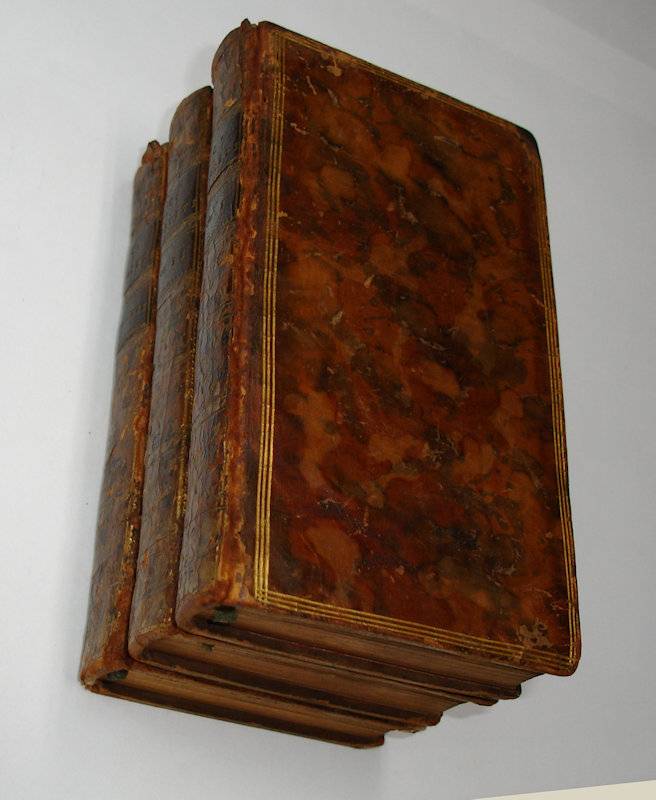TACITUS.
C. Corneli Taciti Quae exstant opera. Recensuit J.N. Lallemand.
Paris (Parisiis), Apud Desaint & Saillant, (...) typis J. Barbou, 1760.
12mo. 3 volumes: XXIV,444; (VI),480; 456 p., 3 frontispieces. Mottled calf. 16 cm (
Ref: Schweiger 2,1004: 'L.'s Noten sind von Werth'; Dibdin 2,455: 'one of the most beautiful and correct of all his classics'; Moss 2,645: 'A pleasing and accurate little edition'; Graesse 6/2,10: 'Jolie edition dans laquelle le texte d'Ernesti (of 1752) a ete corrigé à l'aide d'un manuscript de Paris'; Ebert 22175; Brunet 5,636: 'Bon texte') (
Details: Backs with 2 shields, and gilt with fleurettes. Edges of the boards and the bookblocks also gilt. Boards with triple fillet gilt borders. Marbled endpapers. The frontispiece of the first volume, designed by Ch. Eisen and executed by L. Lempereur depicts Tacitus in his study; Tacitus looks at a bust of Agricola, his father in law. The second frontispiece depicts Messalina, the wife of the emperor Claudius; the third Galba. Barbou's woodcut printer's mark on the three titles, depicting an old man who stands in the shade of a vine-entwined elmtree, symbolising the symbiotic relationship between scholar and publisher. The motto is: 'Non solus'. Three nice engravings in the text) (
Condition: Bindings scuffed, especially at the extremities. Corners bumped. Two joints are splitting. Front joint of volume three is cracking. Old ink inscription on the front flyleaf of volume one) (
Note: The Roman historian Publius Cornelius Tacitus offered ammunition for many intellectual and political battles in 16th and 17th century Europe. The turmoil caused by the emerging new monarchies in England, France en Spain, civil and religious wars in Italy and Germany, and the plague, made Tacitus' account of the state of the early Roman Empire increasingly topical and relevant. The debate Tacitus provoked in intellectual circles was of course on Roman history, but also on literary style, in Latin and the vernacular, but more so on historical and political thought. Tacitus ideas were not original, but he brought them in a forceful lapidary way, oneliners ready for the use in debate. Tacitus became in a corrupted world 'the one true guide for those involved in the awful revolution of modern times: he "teaches well the mode of life under tyrants, just as he teaches tyrants how to establish tyranny'' '. (The Classical Tradition, Cambr. Mass., 2010, p. 921) The French humanist scholar Muretus (Marc Antoine Muret, 1526-1585) declared that 'Tacitus' descriptions of lost liberty, failed revolutions, vicious civil wars, and mad emperors amounted to a theater of our time'. (Op. cit., ibid.) The French encyclopedists of the 18th century 'turned Tacitus into an enlightened enemy of obscurantist princes. This is the Tacitus, wise and mild, who prevailed in Europe immediately before the French revolution'. (R. Ash editor, 'Tacitus', Oxford, 2012, p. 429) In the preface to this Tacitus edition of 1760 the French scholar Nicolas Lallemand acknowledges that he used for his work the editions of Lipsius, Ryckius, Ernesti, and especially the edition of J. Gronovius that was published in Leiden in 1721; he was advised, he tells, by Claudius Capperonerius, or Claude Capperonnier, custos of the Royal Library, and 'Regius linguae Graecae professor'. Lallemand's text contains the readings of some manuscripts of the Royal Library, especially of those which coincide with the 'editio princeps'. Worldcat records 20 reissues of Lallemand's edition between 1760 and 1832) (
Provenance: On the front pastedown of all three volumes the armorial bookplate of G.C.J. Vosmaer. Gualtherus Carel Jacob Vosmaer, 1854 - 1916, was a Dutch zoologist. He was the son of the Dutch author Carel Vosmaer, who produced a successful translation of Homer's Ilias and Odyssea) (
Collation: pi1, a12, A-S12, T6; pi2, A-T12, V-X6; pi2, A-S12, T-V6) (Photographs on request)
Book number: 120324 Euro 225.00
Keywords: (Oude Druk), (Rare Books), Latin literature, Roman history, Tacitus, römische Geschichte, römische Literatur
 TACITUS.
TACITUS.